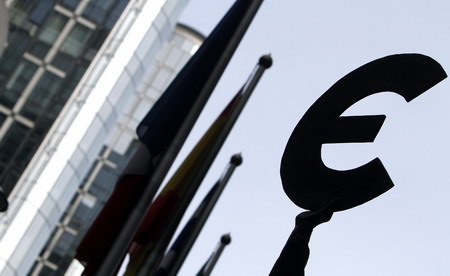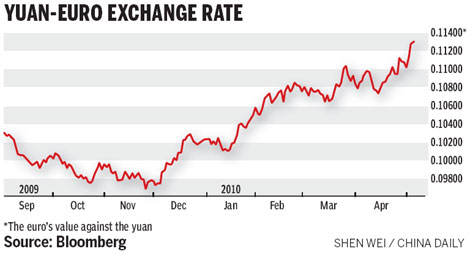Economy
Greek contagion fear stalks global markets
By Ding Qingfen and Xin Zhiming (China Daily)
Updated: 2010-05-06 09:09
 |
Large Medium Small |
|
 |
|
A statue which depicts a woman holding up the symbol of the euro is seen at the European parliament in Brussels. [Provided to China Daily] |
BEIJING - The contagion from the Greek deficit crisis has started to spread across the globe, prompting economists to express concern over the ripple effects on China's export prospects and financial reform.
Despite the European Union-International Monetary Fund (IMF) bailout plan, the euro declined further against the dollar while oil prices fell to near $82 a barrel on Wednesday.
"The degree of access to IMF resources provided to Greece is unprecedented and reflects the seriousness of the problems that Greece has gotten itself into," said Eswar Prasad, senior fellow at the Brookings Institution in the United States.
It is by no means clear that Greece will be able to cope with the kind of pain implied by the austerity arithmetic it faces, Singapore's DBS bank said in a report. "What then? Anything is possible and nothing looks good."
The EU-IMF loan gives some breathing room to Greece and other economies in the euro area to buckle up and get their fiscal houses in order, along with their financial systems and labor markets, Prasad told China Daily. "But it is only a respite rather than a free pass to get back to business as usual."
Analysts feel China would not suffer serious direct investment losses given its limited exposure, but exports could become a victim of the butterfly effect. "The turmoil triggered by Greece will hurt the already-weak growth outlook for European Union (EU) countries and keep the euro weak relative to the dollar, creating a double hit on prospects for China's exports to its most important market," said Prasad.
The crisis could also have a mixed impact on China's yuan exchange rate reform. Since mid-2008 the yuan has been largely unchanged against the dollar and there is now pressure from foreign countries for a revaluation.
The European crisis is likely to delay China's decision to revalue the yuan, especially if there are ripple effects from the crisis on economies and currencies in other regions, said Prasad.
The euro is expected to further decline as a result of the crisis, which naturally reduces the pressure on yuan appreciation, analysts said. "The pressure would be less in the short term, but certainly won't disappear," said Gao Huiqing, an economist with the SIC.
Yuan forwards weakened for a fourth day on Wednesday, the longest losing streak in seven weeks, on concern the sovereign debt crisis in Europe will prompt China to delay an end to its currency peg.
Dong Yuping, a senior economist with the Chinese Academy of Social Sciences (CASS), said: "The Greek crisis could drive international capital out of Europe and flow to regions such as China, which recovered faster than other countries from the global financial crisis."
Dong said the crisis, in which Goldman Sachs and major American ratings agencies are suspected of having played a dubious role, would make Chinese policymakers more cautious in liberalizing its financial system.
"China should certainly push for financial opening up, but it must also pay close attention to potential risks that could be caused by irregularities of foreign financial giants."

Associated Press contributed to the story













